Sustainable travel
Speak to a Rwanda Holidays & Safaris expert today
and start planning your tailor-made holiday

Alistair
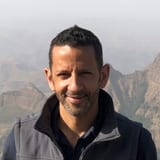
Ben

We take a look at some of the reasons behind Rwanda's conservation and community success story

Rwanda has a tragic recent history meant it entered eco-tourism very late in comparison to other counties, allowing them to learn from both mistakes and success stories. Using a carefully considered strategy has enabled Rwanda to now become an economic model for many other African counties.
There are a few clear tactics which have been fundamental in Rwanda’s sustainability and eco-tourism strategy.
We take a look at the success of these strategies, key partnerships, also how Rwanda has positioned itself as an exclusive high-end safari destination with low visitor numbers in a similar way to Botswana. And how they are increasing their wildlife conservation beyond gorillas, reintroducing animals to their national parks and promoting the tremendous diversity of the ‘land of a thousand hills’.
The Rwandan Government in partnership with the Rwanda Development Board (RDB) have adopted a policy whereby 10% of all revenue generated by the national parks is given to the local communities and has successfully funded over 700 community-based projects with the investment of over USD $5.5m.

These community projects are key to providing clean drinking water, building health centres and hospitals, school classrooms, housing for vulnerable members of the community as well as improved sanitation.
It is through the funding of impactful community-based projects which helps rally communities behind conservation, with a remarkable increase in support as there are long-term benefits to saving wildlife rather than the short-term, lucrative temptations of poaching. The generation of tourism revenue prompts residents near parks to support conservation initiatives and avoid poaching, which is one of the biggest threats to wildlife conservation.

Community involvement has had such a huge influence on conservation to the point where even former poachers are now dedicated protectors of wildlife.
There are also funds set aside to help compensate farmers whose crops are eaten by other wildlife such as golden monkeys who venture beyond the borders of national parks in search of food.
In 2019, using park revenues raised in 2018, RDB allocated 1.4 billion Rwandan Francs (about $1.5 million) to the revenue sharing program, helping to better the lives of communities in rural Rwanda. The government also reinvests money back into the national parks by buying more land, which will increase gorilla and other wildlife habitats and thusly strengthening their numbers, and in due course will increase the money that goes back into the community.
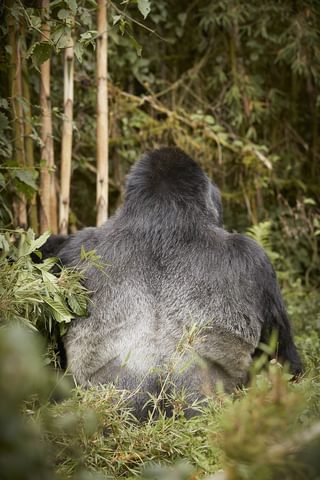
Gorilla conservation has become the backbone of Rwanda’s eco-tourism strategy and plays a key role to the successful economic growth of tourism. And because of this strong focus it has led to the numbers of mountain gorillas increasing year on year in Volcanoes National Park and the greater Virunga Massif, which is an area comprising of the Mikeno sector of Virunga National Park in neighbouring Democratic Republic of Congo, Volcanoes National Park in Rwanda and Mgahinga Gorilla National Park in Uganda. This increase could not have happened without the support and collaboration of conservation partners, as well as the cooperation of the members of the communities surrounding the park, not only in Rwanda but in Uganda and DRC as well.
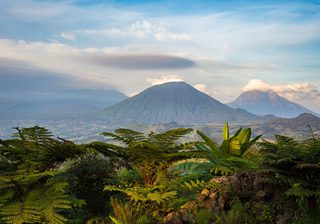

Rwanda has worked very hard, making vast improvements in services, facilities and providing very high standards of experiences which in turn draws increasing numbers of visitors year on year. The knock-on effect has seen an increase to increase the amount of support given to local communities through the revenue sharing program.
Although Rwanda may offer a more expensive wildlife experience than some of its neighbours, with the price of a single gorilla trekking permit costing USD $1,500 in comparison to Uganda which currently stands at USD $700, communities living alongside wildlife are beginning to coexist in a more meaningful manner, which in turn means wildlife is ultimately the winner as there are less threats to its survival.
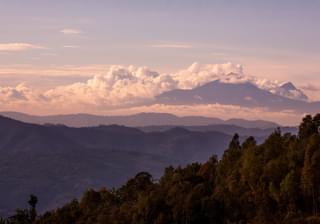
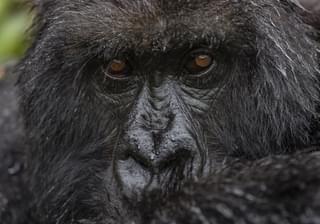
The mountain gorillas in the Volcanoes National Park are a powerful economic engine for Rwanda – whilst overall park revenues in 2018 reached over $21 million, permits sold for tracking gorillas accounted for over US$19 million of that total figure. And with tourism growing prior to the COVID-19 pandemic, employment opportunities within this sector were also growing year-on-year.
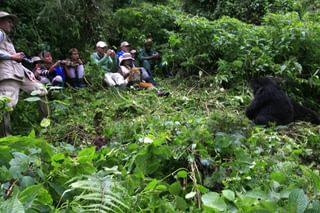
Primate trekking permits are expensive but for good reason, a large proportion of the funds go directly to the relevant wildlife authority, paying for wages, facilities and much needed equipment for research, field, medical teams as well as the anti-poaching units which patrol the thick rainforests to protect the wildlife.
Field and research teams spend a great deal of time with these great primates, learning about their behaviour, how best we can protect them from extinction and increase their chance of survival.
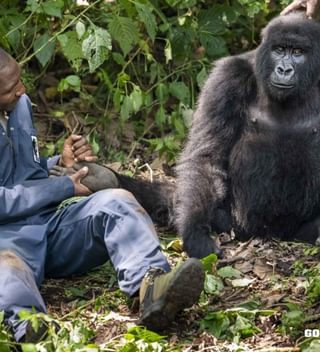
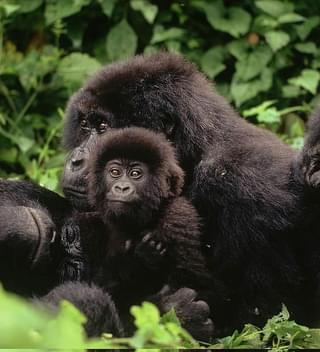
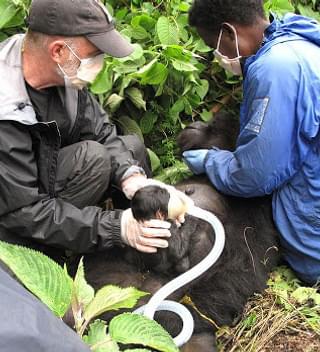
Medical teams also play an integral role. If an injured or sick gorilla is found they work tirelessly to bring it back to health, either in the field or by taking it to specialised medical facilities – which as you can imagine is a huge task in itself. It can be high-risk to sedate a gorilla but then if one is taken back to a medical facility, it will also put a lot of stress on the animal… and then there are the added complications of reintroducing the patient to its family. Occasionally they are not accepted back into the troop due to other members thinking they may have left the group to establish themselves elsewhere.
By travelling to Rwanda (as well as Uganda and DRC), and taking part in gorilla and other primate trekking activities, you really are directly helping conservation, research and giving wildlife the best chance for survival in this ever-changing world.

Another focus of Rwanda’s strategy has been to attract high-end brands from which to centre its eco-tourism model, setting itself as luxury destination, providing a more exclusive experience for guests than some of its neighbours. Tourism in Rwanda has grown rapidly, largely driven by the fact that Rwanda is one of only two countries where tourists can visit the endangered mountain gorillas safely, with Uganda being the other.
Because of this increased demand, more and more high-end lodges are being invested in by recognised eco-tourism brands such as Singita, One&Only and Wilderness Safari, which in turn leads to more benefits for local communities through employment and funding community projects culminating in the conservation of the endemic wildlife.
Rwanda doesn't just cater for those seeking a luxury, high-end experience. For those looking for a more economic solution there's plenty of fantastic options to choose from.
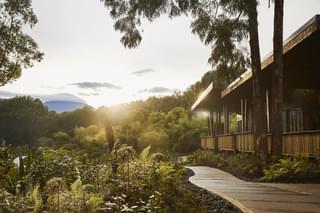
One&Only Gorilla's Nest makes for the perfect place to enjoy a once-in-a-lifetime personal encounter with the rare and noble mountain gorillas roaming freely in their natural habitat., offering an exclusive front-row seat to the world’s most popular mountain gorilla sanctuary.
Be inspired by One&Only Gorilla's Nest - Volcanoes National Park
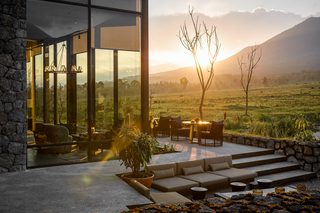
A contemplative and nurturing place, there's no better way to experience the gentle regenerative spirit of Rwanda Situated on the boundary of the Parc National des Volcans, With stunning uninterrupted views of the mountainous, forested national park, the sustainable lodge sits snugly within the dramatic volcanic chain.
Find out more about Singita Kwitonda Lodge - Volcanoes National Park
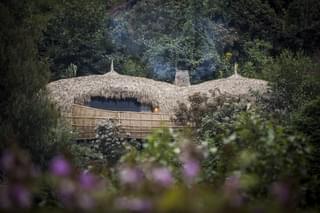
An innovative, responsible, visionary and luxurious lodge adjacent to Volcanoes National Park. Bisate Lodge has commands fantastic views of the Bisoke and Karisimbi volcano peaks rising through the forests of nearby Volcanoes National Park. The aim of Bisate is to be a model of sustainable ecotourism in Rwanda.

Africa African Parks is a non-profit conservation organisation founded in 2000, in response to the dramatic decline of wildlife and protected areas in Africa. They work closely with local government and communities to conserve and rehabilitate national parks and wildlife throughout the African continent.
African Parks puts in place long-term management strategies which focus on economic development and poverty alleviation for the surrounding communities. This approach ensures that moving forward each national park under their management is ecologically, socially and financially sustainable.
At present, it manages 19 national parks and protected areas in 12 countries, covering tens of millions of hectares. African Parks has the largest counter-poaching force for a conservation organisation and the rangers are often the only stabilising force in some of the most remote areas in Africa with the majority of their ground teams being employed from local communities.

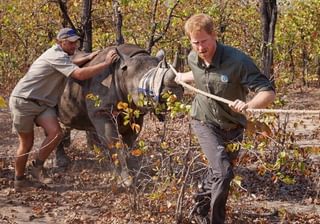
African Parks have been in partnership with Rwandan wildlife authorities since 2009 when they took over the management of Akegara National Park. Since then, the park has continued to flourish; lions have been reintroduced after becoming locally extinct in the 1990’s with their population having tripled and in 2017 black rhino were also successfully reintroduced, granting the park its ‘Big Five’ status.
As of 07th October 2020, African Parks have taken over the management of Nyungwe Forest with the new agreement being a testament to the partnership built with Rwanda Development Board. The new partnership will create substantial and meaningful opportunities in the local area by expanding wildlife and conservation management infrastructures as well as increasing tourism and community projects in the region.

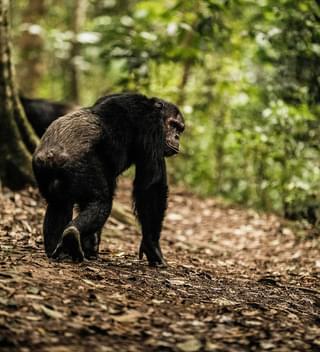
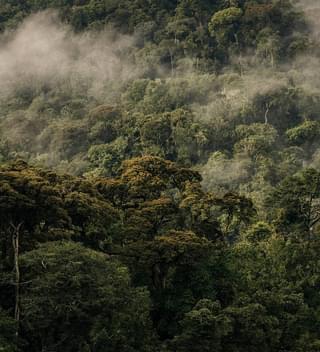
Although mountain gorillas are the main draw for visitors, Rwanda’s rich tapestry of habitats make it an inviting home for a diverse range of wildlife with many more exciting wildlife experiences across this lush, hilly and vibrant country such as chimpanzee, hippo, giraffe, elephant, leopard, lion, zebra, rhino and more than 700 kinds of birds.
The success of mountain gorilla conservation coupled with community engagement has made the resurgence and rejuvenation of other national parks in Rwanda possible with RDB prioritising making the country seen as well-rounded destination and not one which is solely used as a ‘quick stop’ to incorporate gorilla trekking experiences as part of a longer, multi-destination safari. And their strategy is working, there is an increasing demand to explore other regions such as Akegara National Park, Nyungwe Forest and Lake Kivu.
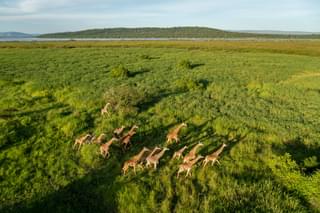
One of Africa’s oldest and most scenic savannah national parks, and today is Rwanda’s only ‘Big Five’ protected area. Despite its relatively small size in comparison to places such as the Masai Mara or Serengeti, the park contains a variety of habitats, from rolling hills and the savannah grassland plains, to a network of wetlands and a series of lakes.
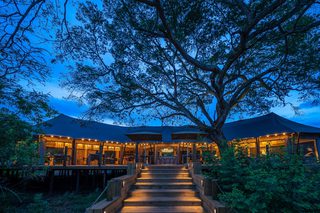
Magashi has been established in partnership with the Rwanda Development Board (RDB) and African Parks, demonstrating their commitment to pioneering sustainable and authentic ecotourism in Rwanda.

Nyungwe Forest is one of Africa’s biodiversity hotspots and one of the oldest rainforests in Africa. It is home to over a dozen species of primates including chimpanzees, where you can take part in trekking experiences to find them in the lush rainforest as well as over 300 species of birds. There’s plenty of attraction to Nyungwe with stunning tree-top canopy walks and hiking and it’s well worth including in your visit to Rwanda.
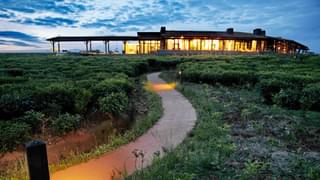
Set perfectly in the heart of lush tea plantations, Nyungwe House is an impressive, remote property with modern accommodation in a great location for primate tours.

Located in the north of Rwanda is a stunning destination in its own right with one of the deepest lakes in all of Africa. Dominating the northern border of Rwanda, there’s no shortage of attractions at Lake Kivu with it’s tranquil beaches, safe swimming (there are no hippo or crocodile), boat trips and canoe safaris where you can visit the many islands on the lake. There is also the remarkable singing fisherman of Lake Kivu who head out every night to find their catch, using their melodic song to synchronise paddling and boost their moral.
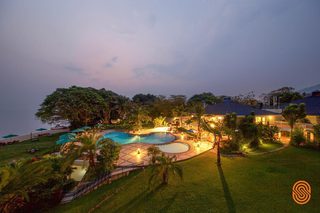
A great choice of hotel in the popular destination of Gisenyi and Lake Kivu. Ideally located to enjoy all the wonderful activities in the area, including water sports on the lake such as canoeing, jet skiing, fishing and boating. The hotel is famous for its beach parties: held twice a year during summer holidays (July) and festive period (December), which feature a lakeside buffet, a beach bonfire and live music.
If you would like to learn more about having a remarkable wildlife safari to Rwanda, experiencing a phenomenal mountain gorilla trekking and exploring the ‘land of a thousand hills’ – speak with one of our Rwanda travel experts and we can help you create your ultimate safari experience.
and start planning your tailor-made holiday


